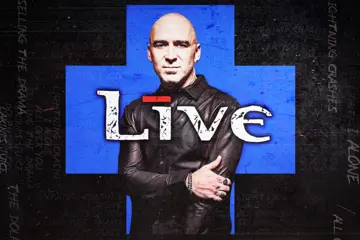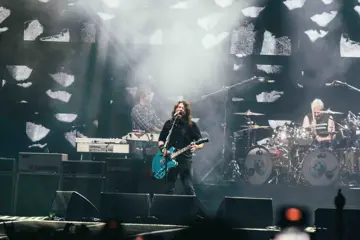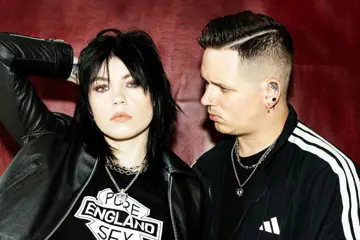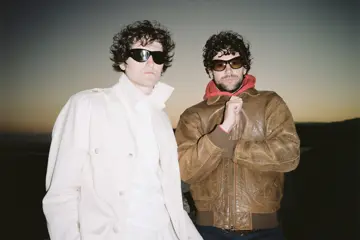The evolution of Ballarat six-piece Hunting Grounds has been an accelerated one. Since winning the triple j Unearthed High competition under the moniker Howl in 2009, they have had a meteoric rise in fortunes – a national support slot for The Living End, stage time at both Golden Plains and the Big Day Out, and an honourable mention for their single In Colour at the International Songwriting Competition Awards.
“Things have happened so fast,” singer/guitarist Michael Belsar concedes. “Before we realised what we were doing we had all these opportunities straight off the bat. But we also had a lot riding on us being a particular thing, a particular sound. It wasn't quite how we saw ourselves. Lachlan [Morrish – vocals/guitar] had this awesome scream, but he got some training and developed that into something altogether better. I didn't really know what I wanted either, but at the time it rolled on until it felt like we needed to look at things again from another angle.”
The change of name can be either an epiphany or an elemental error for a band that have found their way into the musical consciousness. Yet the transformation from Howl to Hunting Grounds hasn't seemed to impede their onslaught one iota.
“We had to change our name from Howl because there were other bands overseas called Howl that were closer to grunge and sludge metal,” Belsar explains. “They were in bigger markets like the UK and the US, so we wanted to avoid any confusion. The fact that Howl is pretty much unGooglable made it a sensible choice in our minds also. Reference points to Allen Ginsberg and Black Rebel Motorcycle Club's album meant that there was always something linked to us inadvertently. Yet I'm not really sure if changing to Hunting Grounds has helped or hindered us to be honest.”

Hunting Grounds in the studio
Don't miss a beat with our FREE daily newsletter
These good fortunes haven't fallen from the sky however. The band has worked tirelessly up to this point to realise their dreams, which are culminating in the imminent launch of their debut record, In Hindsight. Whilst elements of their former guise can be seen on tracks like Kill My Friends, the majority of the material shows a band much more in tune with themselves and what they want to achieve.
“After the change, the only difference was that we spent a much longer time on writing songs for the album,” Belsar states. “After the Unearthed thing we kinda got thrown right in there, and did two EPs back to back in a really short period, with the second written whilst we were on tour, so at the end of all that we were able to take stock and spend a whole year writing helped a lot.”
The first true taste of what Hunting Grounds had to offer was in the form of single In Colour, a heady number that simultaneously whittled away the flab and expanded the boundaries that had inadvertently been placed on them. Yet it has been almost a year since its airing and the introduction to In Hindsight, something that Belsar intimates was a blessing in disguise.
“It wasn't planned to be that way,” he tells. “When we released the single, we thought that we had the album almost there, almost ready to put out. We figured that we had ten to fifteen songs, more than enough material to construct it all around. We got them together and demoed them, worked on them a bit in the studio, but something was missing, we realised that they weren't good enough. We were listening back and it got to a point that we all realised we were being pigeonholed as this band that we don't necessarily want to be. In Colour was completely different to everything else, and felt more like what we wanted to write and sound like. So we decided to go back and attempt to write music that we wanted to listen to rather than creating things in a genre that we felt tied to due to what we started out as.”
This discovery led to six more months of soul searching, yet the end result perfectly encapsulates this next phase for the band. In Hindsight is a much more melodic affair, eschewing the abrasive overtones in favour of space, reverb and a touch of grace. Such an about-turn in their aesthetics came about from shirking the shackles and allowing inspiration to take the reins.
“In Colour truly was a step above in terms of everything we had written as Howl,” Belsar concedes. “Yet to us we felt it was more a step towards where we want to go as a band. It wasn't the blueprint or anything, just a step in the right direction. It taught us to stop writing to fit into a mould or genre and just write. What came forth wasn't planned or discussed beforehand. There wasn't a motive to actively change our sound. I'd been writing my own solo stuff, not for release but as a separate outlet to keep myself occupied, but that stuff came so naturally to me as opposed to writing the earlier stuff back in the day. So when we all got together and just started offering music that came from us instead of possibly what people wanted of us, it was a much easier process. We still hold onto elements of the heavy rock sound that we started out with, but rather than forced it feels like it's more true to life.”
It took some re-immersion into communally revered classics to help redefine the band.
“We have always been fans, but we found ourselves playing Stone Roses a lot during this period,” Belsar asserts. “It doesn't sound as spacey now, but we are all into bands like Slowdive and Ride, even Radiohead who we have always loved, and that was clear on the demos. Some of the production mirrors that influence still. The perfect example is Flaws, which was originally a slow rock jam that was going to be a B-side. But our producer Woody (Paul Annison) saw something in the lyrics and melody, and we reworked it into this tripped-out pop song.”
In Hindsight is a less direct album than its predecessors as a result, requiring time to indulge in its myriad intricacies. Belsar admits that it is all part of their learning curve which started out as a group of friends mucking about outside of school hours.
“The whole writing process is much more of a collaboration now. It was always fairly democratic, but some people were at different stages with their instruments and their confidence, so it was fair that some people had more say than others in the beginning. It says a lot about me too. There was a time where I wrote all the early Howl stuff, and I didn't really give space for anyone to contribute because the songs were whole with all the parts planned out. Now there are still main songwriters, but everyone feels strongly about the music, everyone offers their input on where things should go. The way we write now the music feels so much freer and open for interpretation and addition. Everyone was willing to collaborate a lot more, and Galen [Strachan – keys] brought his own songs to the table, and his ideas meshed with mine in a unique way for us that then became the album. He was writing from a polar opposite angle than I was. He put them all together in a way that I thought wouldn't make sense until we got into the studio. Because everyone has their own influence now, Hunting Grounds is a sound that comes from six different directions, smoothes over any cracks and becomes its own thing.”
This aspect is never more telling than with Kill Your Friends, a great live track and the closest song that adheres to their previously heavier sonic climes and which seems incongruous to the rest of the album.
“That song is like us bridging the gap,” Belsar states. “It's a really old song, and it became important to have it on the album because there seems to be a risk of alienating old fans when it appears that you've changed so dramatically. We don't want to get rid of the heavier stuff either, and it's one we always play in our sets, so it is a song that acts as a guide in our transformation.”
With so much emphasis on the metamorphosis of Hunting Grounds, the title of their debut record stands as a particularly pertinent one. “In a way it's an ironic title referring to looking back at something that hasn't actually happened yet,” Belsar concurs. “We have changed so dramatically that In Hindsight is a new start for us. Even though the last three years have happened and informed everything, Hunting Grounds feels like a new band starting out all over again.”















